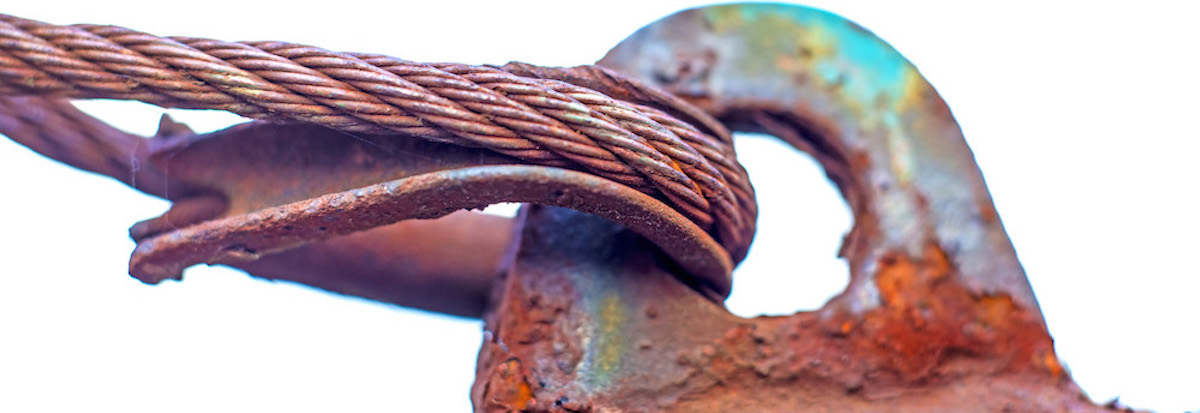What Does “Corrosion Resistant” Mean?

Corrosion resistance is one of the many benefits of working with electrical components like MIL-SPEC connectors and NATO connectors/plugs. When you work with wires, cables, and other types of electrical equipment, it’s important to understand corrosion and how to disrupt it.
So, what does “corrosion resistant” mean? Read on to learn more from Gateway Cable Company!
What is Corrosion?
Before we go any further, let’s answer a preliminary question: What is corrosion? Corrosion is the gradual decay of a material caused by oxidation, chemical reactions, and other influencers. Corrosion spreads easily and is often associated with damage to wires and even humans, so corrosion resistance efforts are important.
What is Corrosion Resistance?
When something is corrosion resistant, it has the ability to resist the oxidation and chemical reactions that cause corrosion. This can be an inherent quality in materials or it can be achieved with protective coatings, like those you would find on corrosion-resistant cables. Metals like copper alloy, for example, display a variety of corrosion-resistant characteristics that make it a desirable choice, such as resistance to localized corrosion, pitting, cracks, and intra-granular corrosion.
Different Types of Corrosion
We’ve already answered, “What is corrosion?”, but it’s also important to understand that corrosion comes in many forms. Here are some of the many types of corrosion:
- Atmospheric: The most common type of corrosion. Caused by exposure to oxygen and water vapor in the atmosphere.
- Uniform: Occurs uniformly over all surface areas.
- Pitting: Localized corrosion that results in a pit.
- Crevice: Localized corrosion that occurs in cracks or spaces.
- Galvanic: Localized corrosion occurs when two dissimilar materials are joined in a corrosive electrolyte.
- Stress Corrosion Cracking: Cracking in a corrosive environment can cause the failure of materials.
- Inter-Granular: Localized corrosion that occurs at the grain boundaries of the metal.
- High-Temperature: Refers to a variety of corrosion types, including oxidation, sulfidation, ash/salt deposit corrosion, metal dusting, and molten salt corrosion.
- Microbial: Corrosion that occurs as the result of micro-organisms’ metabolic activity.
Is Corrosion Bad for Wires?
Yes. Corrosion, or rust, can lead to the loss of purity within wires. This also means that wires can lose their unique properties, such as conductivity. Corrosion can even cause a wire to break if it rusts through, creating a short circuit.
Can Corrosion Spread?
Yes. Corrosion spreads very easily once it has started. While there are products that help curb the spread of corrosion, the maxim “an ounce of prevention is worth a pound of cure” certainly applies when it comes to corrosion or rust.
Can Rust Be Harmful to Humans?
Yes. Rust, AKA corrosion, can be harmful to humans. For instance, if you touch a rusty jagged surface and get cut, you could get tetanus. While it’s not the rust itself that’s harmful — and surface/skin contact with rust won’t cause you any harm — certain bacteria that commonly live on rusty surfaces can cause tetanus and other harmful health issues.
How is Corrosion Prevented?
There are many types of corrosion-resistant or rust-proof metals, including aluminum, certain grades of stainless steel, galvanized steel, and red metals like copper. This doesn’t mean these metals never corrode, however. Protective coatings are available to prevent corrosion based on the material of the component. For example, you may use a zinc and aluminum coating to prevent galvanic corrosion in steel alloys and iron. We offer a range of corrosion-resistant cables and parts, such as our slave cables and adaptors. This saves you the hassle of shopping around. Our experts can point you in the right direction — no matter the application.
Find Corrosion-Resistant Cables & Other Parts at Gateway Cable Company!
Need a specific cable, receptacle, hook-up wire, or another component with corrosion-resistant properties? Gateway Cable Company is an ISO Certified facility with a knowledgeable team that’s ready to help you get the tools you need. Contact us to learn more about our military-grade inventory or request a quote online!
